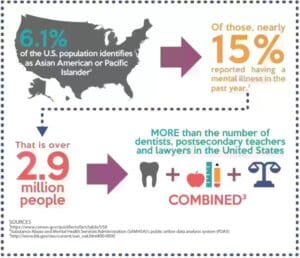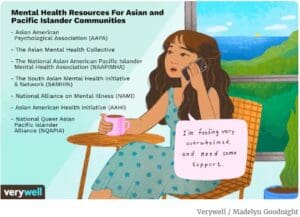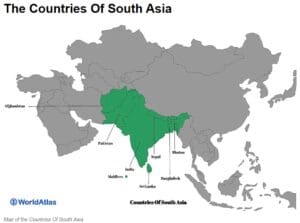South Asian Communities & Mental Health
There is growing concern for the mental health crisis impacting South Asian American communities, and the causes of this crisis are complex. From cultural and generational differences, lack of Asian American therapists, and myriad other reasons, many in the South Asian community view mental health with a stigma. Read on to learn more about South Asian mental health and where to find help.
Overview:
- Mental health statistics for South Asian American communities
- Impacts on Asian American youth mental health
- South Asian American therapists and other mental health resources

Infographic courtesy of Mental Health America
Mental Health Statistics for South Asian American Communities
Mental health stigma in the South Asian community makes it challenging for individuals to seek therapy.
UCLA Health found that Asian Americans are 50% less likely to seek mental health services than other racial groups. The disconnect between generations within South Asian communities contributes to the stigma around mental health. Older Asian Americans silently experienced traumatic events in immigration, racism, family conflict, and financial stress.
Resiliency is a highly valued trait within Asian cultures, and it is weaved within the culture and can appear as a mental health stigma where Asian Americans repress their mental health needs out of fear of showing weakness.

Infographic courtesy of Verywell Mind and Madelyn Goodnight
Impacts on Asian American Youth Mental Health
Consequently, Asian American youth are impacted the most by mental health stigma within their community.
The South Asian Public Association found that US South Asian youth are at greater risk for suicidal thoughts and behaviors than other minority groups. Asian American youth often don’t feel safe disclosing their mental health as a result of the shame associated with mental illness. Lack of mental health resources and education about mental health breeds damaging labels about mental illness, such as “crazy” or “soft.” Additionally, cultural values such as collectivism and privacy within Asian cultures present unique challenges to individuals seeking therapy to resolve issues within their families.
In other words, it is taboo to discuss personal problems that risk one’s or the family’s reputation. Poor mental health awareness within the South Asian community leads to a dismissal of anxiety, depression, and other mental health illnesses.

Map courtesy of WorldAtlas.
South Asian American Therapists & Other Mental Health Resources
The lack of South Asian therapists is another barrier to treatment. Asian Americans represent a little over 10% of the current workforce of therapists. Asian communities have unique dynamics and cultures that require more specialized training and a culturally humble stance.
I interviewed Asian clients, and they shared that they want a therapist who looks like them and understands their cultural dynamics. Literature supports the need for familiarity and comprehension. The therapeutic relationship is a strong predictor for successful outcomes in treatment.
If you can relate to this blog, do not suffer in silence. You have the power to break generational patterns. You can find a culturally competent therapist, such as myself, who understands your background. Websites like South Asian Therapist and Psychology Today make it easier than ever to find a therapist who looks like you.
There’s strength in vulnerability and commitment to healing. Invest in your mental wealth. Your future self will be grateful.

Jagkirpal Channa (pictured here) is a CFR Staff Therapist
About the Author
Jagkirpal Channa, MFT, MS, is a Pennsylvania Staff Therapist at the Council for Relationships. If you would like to discuss topics about South Asian mental health or learn about his current availability for accepting new clients, go here.
See our Therapist & Psychiatrist Directory to find a different CFR therapist or psychiatrist near you.
